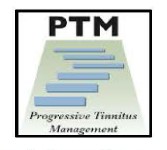Management of Tinnitus
The following information has been adapted from the Department of Veterans Affairs (VA) Rehabilitation Research & Development (RR&D) National Center for Rehabilitative Auditory Research (NCRAR) “Tinnitus Questions & Answers” brochure.
What is tinnitus?
Tinnitus is humming, ringing, buzzing, or other sounds in the ears or head.
How do you pronounce “tinnitus”?
“ti-night-us” or “tin-uh-tus” – either is correct.
What causes tinnitus?
There are many causes of tinnitus that may include exposure to loud noise, head injury, medications, ear wax and many other causes. For many people it is impossible to know the exact cause of tinnitus.
Is there a cure for tinnitus?
There are labs around the world looking for a cure, but there isn’t a cure yet. However, there are many ways to feel better without making tinnitus quieter.
How can I feel better without making my tinnitus quieter?
You can feel better by learning how to change your reactions to tinnitus - or by learning to manage your reactions to tinnitus. It is also important to exercise and eat right.
How can I manage my reactions to tinnitus?
You can use sound to make life with tinnitus more comfortable and pleasant. Soothing sound can help you feel better without making your tinnitus quieter. Interesting or entertaining sounds can help get your mind off your tinnitus. Background sounds make it easier to ignore your tinnitus. You can learn to make a plan for using sound to help you any time tinnitus is a problem.


You can learn exercises to help you relax. Learning how to relax when you want can help you feel better. You can plan pleasant activities even when your tinnitus is bothering you. Pleasant activities can help you enjoy life and help you get your mind off your tinnitus.
What you think affects how you feel. You can change how you think about your tinnitus from “there’s no hope for my tinnitus” to thoughts like “I’m learning new ways to feel better without making my tinnitus quieter.” With practice, changing your thoughts and attitudes can help you feel better. Ask your audiologist where to get help coming up with new ways to think about your tinnitus.
Does my tinnitus make it harder for me to hear?
Many people have hearing problems along with tinnitus. Some people think that the tinnitus causes their hearing problems – which is not true (hearing loss is usually the cause of hearing problems). If you have tinnitus or hearing problems, you should have a hearing test.
Can drugs help?
It is rare for a drug to reduce the loudness of tinnitus. All drugs used for tinnitus were actually developed for other problems like: depression, anxiety, and trouble sleeping. Some of these drugs can improve your mood. A better mood can help make tinnitus less of a problem.
What should I do about my tinnitus?
Start by getting a hearing test (and hearing aids if needed). Hearing aids can help with a hearing problem by amplifying sounds. Amplifying sounds can also help with tinnitus. Most people say that they notice their tinnitus less when they are wearing hearing aids.
What if I need more help?
If you need more help, contact your hearing health care provider. Department of Defense (DoD) and Department of Veterans Affairs (VA) Audiologists are trained to help you with your tinnitus. Progressive Tinnitus Management (PTM) was developed by VA and is used by DoD and VA. PTM teaches how to use sound to cope with tinnitus.
PTM also teaches how to change your thoughts and feelings to cope with tinnitus. Your audiologist can provide you with PTM materials, and can help you learn how to use them.


For more information:
Contact your audiologist.
Use the internet: go to www.ncrar.research.va.gov/ForVets/